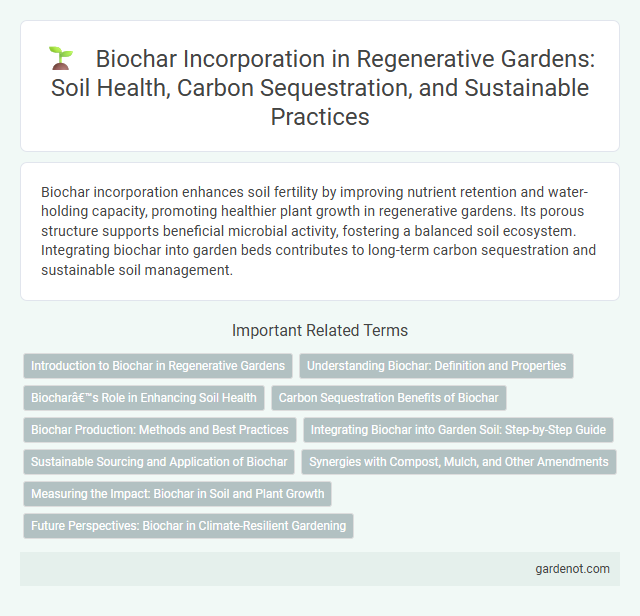Biochar incorporation enhances soil fertility by improving nutrient retention and water-holding capacity, promoting healthier plant growth in regenerative gardens. Its porous structure supports beneficial microbial activity, fostering a balanced soil ecosystem. Integrating biochar into garden beds contributes to long-term carbon sequestration and sustainable soil management.
Introduction to Biochar in Regenerative Gardens
Biochar is a carbon-rich material produced through the pyrolysis of organic biomass, essential for enhancing soil health in regenerative gardens. Its incorporation improves soil structure, increases nutrient retention, and supports beneficial microbial activity, fostering sustainable plant growth. By sequestering carbon, biochar also plays a crucial role in mitigating climate change while restoring garden ecosystems.
Understanding Biochar: Definition and Properties
Biochar is a carbon-rich, porous material produced through the pyrolysis of organic biomass in an oxygen-limited environment, enhancing soil health by improving nutrient retention and water holding capacity. Its stable carbon structure resists decomposition, sequestering carbon for centuries while fostering beneficial microbial activity in regenerative gardening. Incorporating biochar into garden soil boosts soil fertility, reduces greenhouse gas emissions, and supports sustainable agricultural practices by promoting long-term soil regeneration.
Biochar’s Role in Enhancing Soil Health
Biochar incorporation significantly improves soil health by increasing nutrient retention and enhancing microbial activity, leading to better plant growth and resilience. This porous, carbon-rich material boosts soil structure, water-holding capacity, and pH balance, fostering a healthier root environment. Studies show biochar can reduce soil acidity and increase the availability of essential nutrients like nitrogen and phosphorus, promoting sustainable regeneration in garden ecosystems.
Carbon Sequestration Benefits of Biochar
Biochar incorporation in regenerative gardens significantly enhances carbon sequestration by stabilizing organic carbon in the soil for centuries. This process reduces atmospheric CO2 levels and improves soil structure, promoting long-term carbon storage. Studies have shown biochar can increase soil carbon content by up to 50%, making it a powerful tool for climate change mitigation.
Biochar Production: Methods and Best Practices
Biochar production involves pyrolysis, a thermochemical process that decomposes organic material in an oxygen-limited environment, optimizing carbon stability and nutrient retention for soil enhancement. The best practices emphasize selecting feedstocks such as agricultural residues or woody biomass, controlling temperature between 350-700degC, and ensuring slow heating rates to maximize biochar quality and porosity. Incorporating sustainably produced biochar into regenerative gardens improves soil structure, water retention, and microbial activity, fostering long-term ecosystem resilience.
Integrating Biochar into Garden Soil: Step-by-Step Guide
Incorporating biochar into garden soil enhances soil fertility, water retention, and microbial activity by improving soil structure and nutrient availability. Start by thoroughly mixing biochar with compost or organic matter to charge it with nutrients before applying evenly across the garden bed. Gradually blend the biochar mixture into the top 6-12 inches of soil using a garden fork or tiller for optimal integration and long-term soil health benefits.
Sustainable Sourcing and Application of Biochar
Biochar sourced from sustainably managed biomass enhances soil health by improving nutrient retention and microbial activity in regenerative gardens. Applying biochar at appropriate rates supports long-term carbon sequestration and reduces the need for synthetic fertilizers. Selecting biochar from renewable biomass ensures minimal environmental impact while boosting garden productivity.
Synergies with Compost, Mulch, and Other Amendments
Biochar incorporation enhances soil fertility by creating synergies with compost, mulch, and other organic amendments, improving nutrient retention and microbial activity. When combined with compost, biochar acts as a habitat for beneficial microbes, accelerating decomposition and nutrient cycling. Mulch combined with biochar helps maintain soil moisture and temperature, optimizing conditions for plant growth and soil health in regenerative gardens.
Measuring the Impact: Biochar in Soil and Plant Growth
Biochar incorporation in soil significantly enhances soil structure, nutrient retention, and water holding capacity, leading to improved plant growth metrics such as biomass and root development. Measuring the impact involves assessing changes in soil pH, microbial activity, and nutrient availability, alongside plant health indicators like chlorophyll content and yield. Empirical studies demonstrate biochar's ability to sequester carbon while promoting sustainable regenerative garden practices.
Future Perspectives: Biochar in Climate-Resilient Gardening
Biochar incorporation enhances soil structure, water retention, and nutrient cycling, making it a key component in climate-resilient gardening techniques. Future perspectives emphasize biochar's potential to sequester carbon sustainably while improving plant health and reducing dependency on chemical fertilizers. Innovations in biochar production and application tailored to specific soil types will drive its adoption in regenerative garden systems worldwide.
Biochar incorporation Infographic

 gardenot.com
gardenot.com